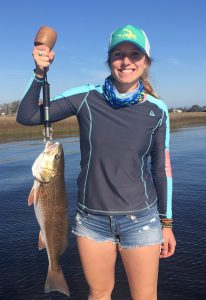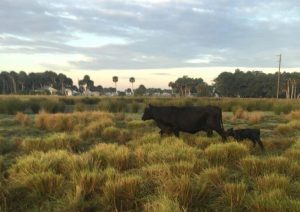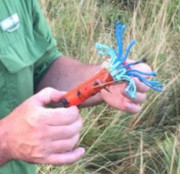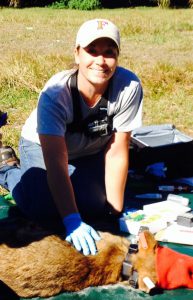By: Bethany Wight, Biologist
UF/IFAS Range Cattle Research and Education Center

Kelly was actually born in the Philippines on an Air Force base and was a citizen for one day until her birth certificate was filed. She spent her early years growing up in Lexington, KY and then her family moved to Wilkesboro, NC, located in the foothills of NC where chickens practically outnumber people. Her family moved again to Winston-Salem, NC where she attended high school. Growing up Kelly enjoyed playing soccer and volleyball and was always involved in extracurricular clubs and school spirit events.
Kelly attended the University of North Carolina at Chapel Hill and graduated with a Bachelor’s in Environmental Science with a focus on ecology in 2013. She also received a minor in Spanish and geology.
“A few years later, I realized my degree in ecology was missing some basic biology and chemistry that I felt was important. I actually went back for another year of school at Metropolitan State University in Denver. Although, the intention was just to take a few more credits, a good portion of the credits from my previous degree rolled over (I know, that never happens) and I was able to get a second bachelor’s degree in Biology in 2016.“

Before starting her Master’s degree, Kelly had several different field technician jobs. Her first and by far her best experience was spending a summer in the remote Alaskan wilderness at the Innoko National Wildlife Refuge working for USFWS. They stayed at a remote field site that could only be accessed by a float plane. Every day they would travel the river by boat and conduct vegetation surveys and small mammal trapping. One of the studies focused on reintroducing bison and they were helping collect general baseline data. Her next job was in Ft. Collins, CO with the CO Parks and Wildlife. The study examined the plague in prairie dogs and Kelly assisted by checking burrows, trapping and collecting various biological samples from prairie dogs. After this she moved to Moab, UT to work for the USGS looking at plants and root systems in drought prone areas. This study examined the differences between C3 and C4 plants by collecting roots and using an advanced software program to measure detailed morphological traits. Her last field job was in Krotz Springs, LA working with the state wildlife agency conducting bear hair snare trap sampling. She helped deploy bear hair snare traps, collected hair and even got to help with some bear tagging and sampling. After her LA job Kelly moved to Florida and began researching professors and universities to pursue a master’s degree.
“I’ve always loved the allure and fear that surrounds large predators. Humans have such a fascinating and complex relationship with these large animals. During the time between college graduations in 2017, I realized how important our thoughts and perceptions are of predators and so I decided I wanted to pursue an education/career that focused on human-predator conflict.”
Kelly began looking for professors throughout the country that were doing human-predator research and came across the wildlife department at UF (I hadn’t known they had one prior to that summer!). Dr. Raoul Boughton had a few projects looking at coyotes and some interactions with cattle and a few short weeks later she dove straight in to some cattle work! Kelly’s research focuses on a new system to examine calf loss, calf mortality, and predator-cattle interactions in Florida.


The first part of her graduate degree focused on calf mortality on Florida ranches. They put birthing sensors in each pregnant cow in order to monitor calving. When a new calving event was detected by these sensors, Kelly responded to the events.
“I had to go to the ranch, find the calving cow, find the calf—which is sometimes harder than you’d think– then at some point I had to handle the calf with a new, usually protective mama cow nearby. Truly, I’m making it more dramatic than it sounds as almost all ranchers will tell you, but I was just getting my feet under me.”
The purpose was to observe calving, mortality events, behavior, and upon successful calving, tag calves for further monitoring of any mortality events. It was a lot of hands on livestock/cattle work which Kelly had not been exposed to prior to this opportunity. They found that average calf mortality in Florida was 9.9% on these ranches and was higher than the national average of 6%. Many of these losses occurred in 24 hours and almost all occurred within the first 10 days of the calf’s lives (90%). Common losses were dystocia (difficult birthing), mineral deficiencies or toxicities, and interestingly, a large part of these losses had bacterial infections that likely played a role in their death. More work is needed to truly understand what the driving causes of these losses are but the project at least gave the Florida cattle industry a focused look at the major issues affecting calf mortalities.


The second, most exciting portion of Kelly’s research is a project looking at Raramuri Criollo cattle as a potential livestock guardian for Brangus herds in south Florida against panthers. They deployed GPS collars and a large camera array in a pasture with 80 Brangus and 11 Raramuri dams to investigate the differences in the breed behavior in the presence of a predator. Using the GPS data and game cameras Kelly is examining clumping and herding behavior when a predator is present. Anecdotel evidence suggests Raramuri Criollo cattle are more aggressive towards large predators, in particular large felids. Their initial thoughts are that Raramuri change their activity patterns and/or clumping behaviors when a predator is present in a way that could deter panther interactions.
When Kelly is not conducting her research she loves being outside!

“I have participated in my first triathlon recently and will likely continue doing so! I love running and swimming, so tagging on the biking was a no-brainer. I love hiking, backpacking, camping, mountain biking, scuba diving when the money and time allows. I’ve recently started brewing my own kombucha- which is super fun. I just started the first alcoholic kombucha batch, so keep your fingers crossed. I also like to use the right side of my brain and do some crafts, like sewing and creating cards/decals.”
Kelly is planning to graduate in summer 2020, just around the corner. After she graduates Kelly is taking a year off to travel with her husband and dog. They have outfitted a sprinter van into a camper and plan to travel the country with everything they need right in their van! After her year off Kelly would like to continue research into predator-human interactions, whether that be in a career or further education.
“Eventually, I would love to work for the federal government. My ideal job would include researching predator-human interactions and working with the community directly involved with the species to guide research questions. I would love to focus on conservation efforts for these animals that is practical, data-driven, and promotes coexistence rather than mere tolerance.”
Kelly’s Master’s research is funded by the Florida Cattleman’s Association, the Naples Zoo, USFWS and the USDA.

This was written by Bethany Wight, a biological scientist at the UF/IFAS Range Cattle REC in Ona, FL. If you have questions please contact her at bwight@ufl.edu.
 0
0
